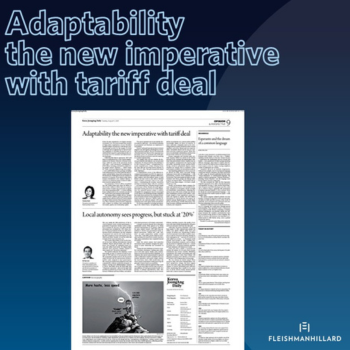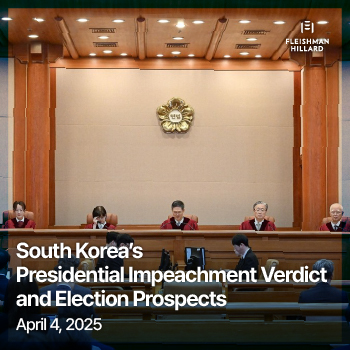Asian Investors Seek Diversification Amidst an Uncertain Global Economy, According to New FleishmanHillard Report on Asset Management in Asia
May 6, 2024
Performance and Credibility Continue to be Major Factors for Investors Picking an Asset Manager
HONG KONG — Investors across Asia continue to look to diversify their investment portfolios amidst an uncertain global economy, according to FleishmanHillard’s The Future of Asset Management in Asia 2024 report.
The report, published with research by TRUE Global Intelligence practice, features analysis drawn from an online survey of 1,250 investment professionals in Asia, with 250 respondents each in, Hong Kong SAR, Japan, Mainland China, Singapore and South Korea between March 30 and April 10, 2024. The report also includes an overview of the latest trends in Asia’s asset management industry.
The 2024 report highlights the key risks currently identified by investors. The majority of investors (42%) are most concerned about slow global economic growth or even a downturn, followed by persistent inflation (24%) and geopolitical tensions (16%). In response to these uncertainties, nearly one-third of respondents (29%) plan to shift their investments towards lower-risk options, while 23% intend to maintain their current risk profile. Notably, investors from mainland China stand out as 49% see more buying opportunities and are increasing their risk appetite or actual investments in high-yield instruments.
While equities funds (51%) and fixed income funds (34%) remain popular among Asian investors in the coming year, there is a growing interest in diversifying portfolios. Investors are now showing enthusiasm for private market investments, particularly in private equity funds (15%) and private credit funds (15%). Respondents believe that these alternative investments can enhance and diversify their returns, complementing traditional stocks and bonds (90%), and helping mitigate overall portfolio risks associated with economic downturns (90%).
In terms of investment sectors, AI (49%) continues to be the most favored sector for the upcoming year, followed by the internet sector (34%), biotechnology and healthcare (33%) and technology, media and telecoms (33%). This indicates a strong preference for new economy sectors that have experienced rapid growth despite global economic challenges.
Patrick Yu, Asia Pacific lead of FleishmanHillard’s Financial and Professional Services sector, commented on the findings, stating, “Investors are seeking to diversify their portfolios to build resilience during this period of global economic uncertainty. Private equity and private credit funds, traditionally favored by institutional investors, are now increasingly attractive to Asian investors. This presents significant opportunities for asset managers to expand their product offerings and communications strategies to cater to the needs of Asian investors.”
Similar to last year’s report, the performance (93%) and credibility (92%) of asset managers remain the most critical factors for investors when choosing an asset manager. Other important criteria include knowledge of individual managers (87%) and the public profile of the asset manager (86%). While the environmental, social and governance (ESG) commitment of asset managers is still considered important (78%), it has declined slightly by four percentage points compared to the previous year’s survey.
Furthermore, Asian investors prioritize sophistication in risk management (86%), transparent fee disclosures (86%) and transparency in communication with customers (84%) as the most important qualities for overseas asset managers operating in their local markets.
Yu emphasized the importance of transparency, profile and reputation for asset managers, highlighting, “More than ever, demonstrating transparency and having a strong profile and reputation are key for asset managers. Credibility and performance are fundamental to these qualities, and it is crucial for asset managers to elevate their strategies, product offerings and ESG commitment to make a difference in the highly competitive environment in the Asia Pacific region.”
The survey findings also revealed:
- Asia Pacific (54%) remains the most popular region for investment in the coming year, with Singaporean investors (69%) displaying the highest confidence in the region. North America (43%) is the second preferred region for investment, particularly favored by Japanese investors (58%).
- Similar to last year, digital platforms (54% of total) are the most popular channel for fund patronage among Asian investors, driven by the variety of fund choices (83% of digital platform users). Independent financial advisers or bank intermediaries continue to be important channels (43%), alongside wealth managers (38%), reflecting that a significant number of investors prefer to receive expert advice through in-person meetings during fund patronage. In particular, mainland China and Singapore investors show an increased interest in purchasing funds from independent financial advisers (60% in 2024 compared to 53% in 2023 for Mainland China and 55% in 2024 compared to 45% in 2023 for Singapore).
- According to the report, financial media (45%) remains the most popular source of information for Asian investors for funds and investment products. However, this proportion has declined by eight percentage points from 2023. Face-to-face interactions, including independent financial advisers or bank intermediaries (30%) and friends and family (29%), are also ranked as important information sources. Notably, mainland Chinese investors prefer social media platforms as their primary source of information (52%) compared to their counterparts in the region.
- Regarding ESG, the most important commitment from asset managers, as cited by investors, is “walking the talk” and taking action in proxy voting in listed companies (82%). Transparency in ESG data and protocol (79%) and clearly defined ESG goals and objectives (79%) are also highly valued.
FleishmanHillard’s The Future of Asset Management in Asia 2024 report includes quantitative data and qualitative analysis on the asset management industry in Asia. All 1,250 respondents self-identified as having traded or invested in at least one of the following: equities funds, fixed income funds, ETFs, alternatives, balanced funds, PE funds, digital assets or cryptos. A Mainland China focused report, The Future of Asset Management in China 2024, is also available for asset managers interested specifically in this growing market.

Find Out More
-
Adaptability the new imperative with tariff deal
August 5, 2025


